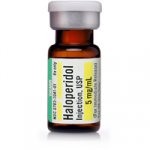

The reason that I love preparing talks to give to residents and fellows is that I always find new and interesting articles that I otherwise would have missed if not for my last minute PubMed searches. Yesterday’s talk on delirium was no exception, as I came across this article in Critical Care Medicine – Haloperidol prophylaxis decreases delirium incidence in elderly patients after noncardiac surgery: A randomized controlled trial. This study appears to be the largest trial to date on delirium prevention in the ICU setting, yet I never knew it was published, and I’m still trying to digest the facts. Here is my quick attempt:
What Did the Study Do?
This was a prospective, randomized, double-blind, and placebo-controlled two-center clinical trial done in Beijing, China. The researchers enrolled patients who were admitted to the ICU after noncardiac surgery. They had a good list of exclusions which included a history of schizophrenia, epilepsy, parkinsonism, use of cholinesterase inhibitor, or levodopa treatment; inability to communicate in the preoperative period; use of haloperidol or other neuroleptics during or after anesthesia; neurosurgery; individuals unlikely to survive for 24 hours; and prolonged QTc.
A total of 457 patients were randomly assigned to either haloperidol group or placebo. The haloperidol group got a 0.5 mg bolus intravenously within 1 hour of randomization. This was followed by continuous infusion of haloperidol at 0.1 mg/hr for 12 hours. That was pretty much it for the intervention, however the authors also enacted multicomponent approaches to reduce risk factors of delirium including nonpharmacologic strategies in both the intervention and control group.
What Did They Find?
The researchers main outcome of interest was whether patients developed delirium during the first 7 days after surgery using the CAM-ICU as the assessment method for delirium. Here is what they found:
- A significant decrease in the incidence of postoperative delirium in the haloperidol group compared to the placebo group (15.3% vs. 23.2%, p .031).
- A longer time to onset of delirium and more delirium-free days in the haloperidol group, as well as a shorter length of ICU stay.
- Similar time to hospital discharge in both the haloperidol and the control group
- No significant arrhythmias during the administration of haloperidol and no significant changes to the QTc interval, and no reported extrapyramidal symptoms
- No change in all cause mortality at 28 days
My First Thoughts:
There were some baseline characteristics that differed between the two groups despite randomization. Duration of anesthesia and surgery were significantly longer in the haloperidol group, as well as the volume of total intraoperative infusion. I’m not to concerned about this as my best guess is that this would make the Haldol group look worse, and the authors adjusted for these factors in a separate analysis. This does beg the question of whether there were any differences in other important factors not measured by the authors, such as baseline cognitive function.
The trial also looks like it enrolled a pretty healthy group of individuals for having needed an ICU stay. Most of the patients were admitted to the ICU after undergoing elective surgery, half stayed in the ICU for less than 24 hours, and few actually developed delirium post-op independent of the group assigned (15.3% in the haloperidol group and 23.2% in the pla¬cebo group). This is a remarkably lower incidence in both groups compared to commonly cited incidence rates (70-80%).
Lastly, delirium is associated with lots of badness – including increased morbidity, mortality, and need for institutionalization. Let’s just say we believe that haloperidol actually decreases delirium incidence in post-op ICU patients. This doesn’t necessarily mean that it will decrease rates of all the bad things that accompany delirium. In truth, we may just be masking the symptom, but not really treating the underlying issue. It would have been helpful to know what the study participants’ functional status was upon discharge and whether or not they needed institutionalization.
Take Home
I really enjoyed reading this article and it gave me a lot to think about, but in the end it failed to convince me that all older adults need a low dose antipsychotic when admitted to the ICU after an operation. What do you think?
by: Eric Widera (@ewidera)



